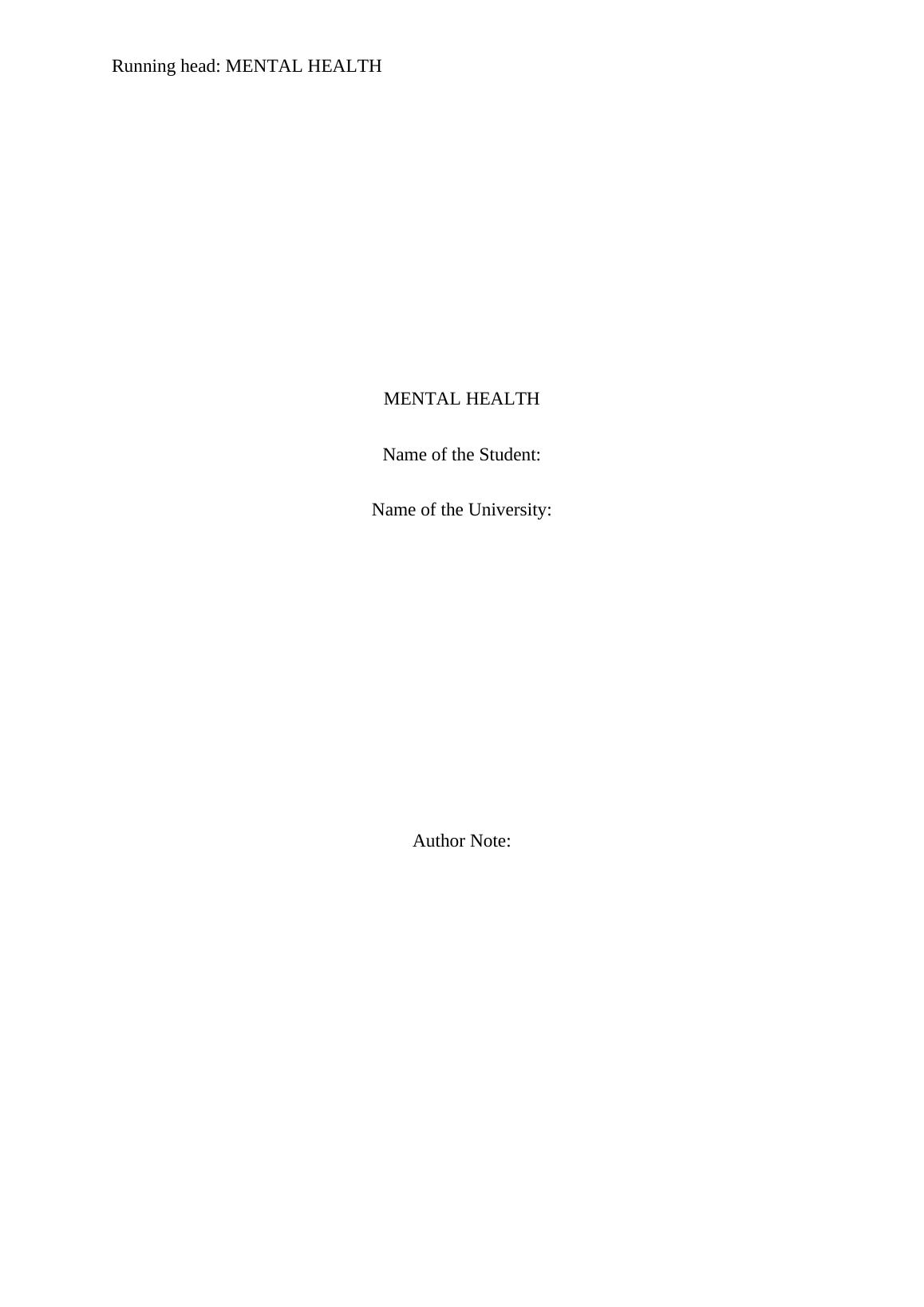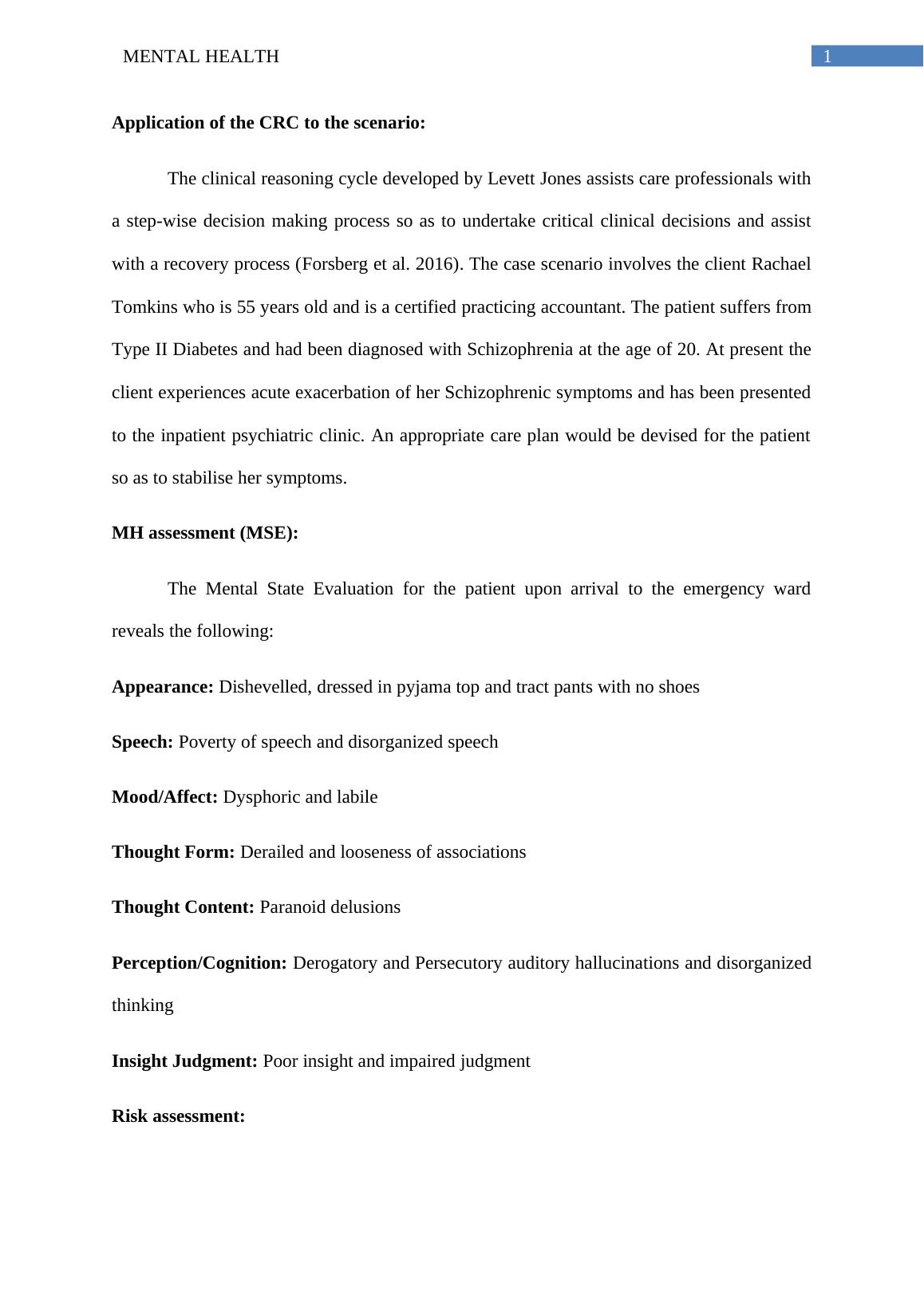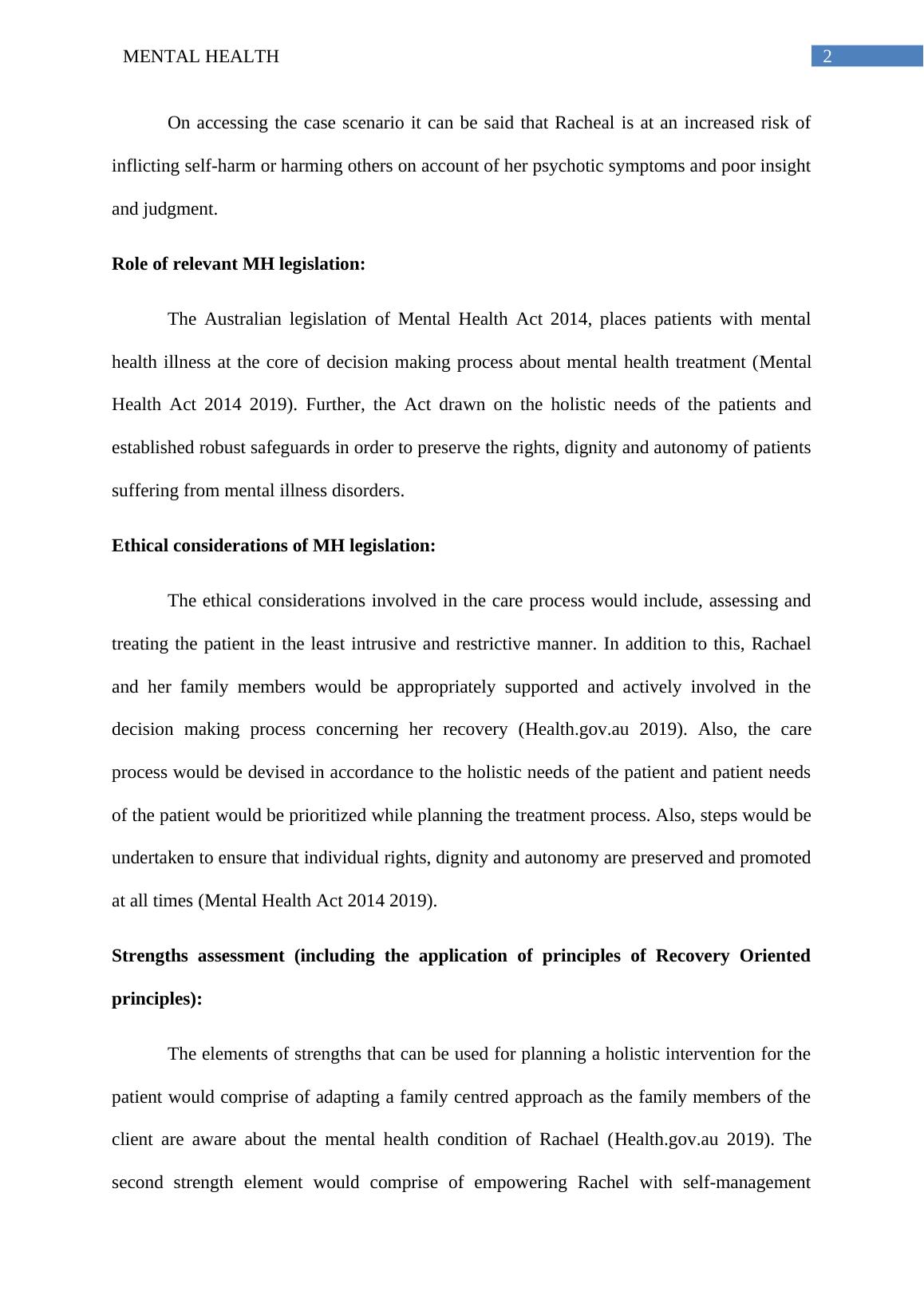Application of the CRC to the scenario
Added on 2023-01-20
6 Pages1057 Words62 Views
Running head: MENTAL HEALTH
MENTAL HEALTH
Name of the Student:
Name of the University:
Author Note:
MENTAL HEALTH
Name of the Student:
Name of the University:
Author Note:

MENTAL HEALTH1
Application of the CRC to the scenario:
The clinical reasoning cycle developed by Levett Jones assists care professionals with
a step-wise decision making process so as to undertake critical clinical decisions and assist
with a recovery process (Forsberg et al. 2016). The case scenario involves the client Rachael
Tomkins who is 55 years old and is a certified practicing accountant. The patient suffers from
Type II Diabetes and had been diagnosed with Schizophrenia at the age of 20. At present the
client experiences acute exacerbation of her Schizophrenic symptoms and has been presented
to the inpatient psychiatric clinic. An appropriate care plan would be devised for the patient
so as to stabilise her symptoms.
MH assessment (MSE):
The Mental State Evaluation for the patient upon arrival to the emergency ward
reveals the following:
Appearance: Dishevelled, dressed in pyjama top and tract pants with no shoes
Speech: Poverty of speech and disorganized speech
Mood/Affect: Dysphoric and labile
Thought Form: Derailed and looseness of associations
Thought Content: Paranoid delusions
Perception/Cognition: Derogatory and Persecutory auditory hallucinations and disorganized
thinking
Insight Judgment: Poor insight and impaired judgment
Risk assessment:
Application of the CRC to the scenario:
The clinical reasoning cycle developed by Levett Jones assists care professionals with
a step-wise decision making process so as to undertake critical clinical decisions and assist
with a recovery process (Forsberg et al. 2016). The case scenario involves the client Rachael
Tomkins who is 55 years old and is a certified practicing accountant. The patient suffers from
Type II Diabetes and had been diagnosed with Schizophrenia at the age of 20. At present the
client experiences acute exacerbation of her Schizophrenic symptoms and has been presented
to the inpatient psychiatric clinic. An appropriate care plan would be devised for the patient
so as to stabilise her symptoms.
MH assessment (MSE):
The Mental State Evaluation for the patient upon arrival to the emergency ward
reveals the following:
Appearance: Dishevelled, dressed in pyjama top and tract pants with no shoes
Speech: Poverty of speech and disorganized speech
Mood/Affect: Dysphoric and labile
Thought Form: Derailed and looseness of associations
Thought Content: Paranoid delusions
Perception/Cognition: Derogatory and Persecutory auditory hallucinations and disorganized
thinking
Insight Judgment: Poor insight and impaired judgment
Risk assessment:

MENTAL HEALTH2
On accessing the case scenario it can be said that Racheal is at an increased risk of
inflicting self-harm or harming others on account of her psychotic symptoms and poor insight
and judgment.
Role of relevant MH legislation:
The Australian legislation of Mental Health Act 2014, places patients with mental
health illness at the core of decision making process about mental health treatment (Mental
Health Act 2014 2019). Further, the Act drawn on the holistic needs of the patients and
established robust safeguards in order to preserve the rights, dignity and autonomy of patients
suffering from mental illness disorders.
Ethical considerations of MH legislation:
The ethical considerations involved in the care process would include, assessing and
treating the patient in the least intrusive and restrictive manner. In addition to this, Rachael
and her family members would be appropriately supported and actively involved in the
decision making process concerning her recovery (Health.gov.au 2019). Also, the care
process would be devised in accordance to the holistic needs of the patient and patient needs
of the patient would be prioritized while planning the treatment process. Also, steps would be
undertaken to ensure that individual rights, dignity and autonomy are preserved and promoted
at all times (Mental Health Act 2014 2019).
Strengths assessment (including the application of principles of Recovery Oriented
principles):
The elements of strengths that can be used for planning a holistic intervention for the
patient would comprise of adapting a family centred approach as the family members of the
client are aware about the mental health condition of Rachael (Health.gov.au 2019). The
second strength element would comprise of empowering Rachel with self-management
On accessing the case scenario it can be said that Racheal is at an increased risk of
inflicting self-harm or harming others on account of her psychotic symptoms and poor insight
and judgment.
Role of relevant MH legislation:
The Australian legislation of Mental Health Act 2014, places patients with mental
health illness at the core of decision making process about mental health treatment (Mental
Health Act 2014 2019). Further, the Act drawn on the holistic needs of the patients and
established robust safeguards in order to preserve the rights, dignity and autonomy of patients
suffering from mental illness disorders.
Ethical considerations of MH legislation:
The ethical considerations involved in the care process would include, assessing and
treating the patient in the least intrusive and restrictive manner. In addition to this, Rachael
and her family members would be appropriately supported and actively involved in the
decision making process concerning her recovery (Health.gov.au 2019). Also, the care
process would be devised in accordance to the holistic needs of the patient and patient needs
of the patient would be prioritized while planning the treatment process. Also, steps would be
undertaken to ensure that individual rights, dignity and autonomy are preserved and promoted
at all times (Mental Health Act 2014 2019).
Strengths assessment (including the application of principles of Recovery Oriented
principles):
The elements of strengths that can be used for planning a holistic intervention for the
patient would comprise of adapting a family centred approach as the family members of the
client are aware about the mental health condition of Rachael (Health.gov.au 2019). The
second strength element would comprise of empowering Rachel with self-management

End of preview
Want to access all the pages? Upload your documents or become a member.
Related Documents
Application of the CRC to the scenariolg...
|5
|972
|62
Case Study Analysislg...
|6
|1012
|76
Nursing Essay on Mental Health Act 2014 and Patient-Centered Carelg...
|6
|1414
|59
Mental Health - Case Studylg...
|8
|2033
|159
RECOVERY MODEL.lg...
|4
|625
|448
Emerging Best Practices in Mental Health Recoverylg...
|8
|2367
|21
